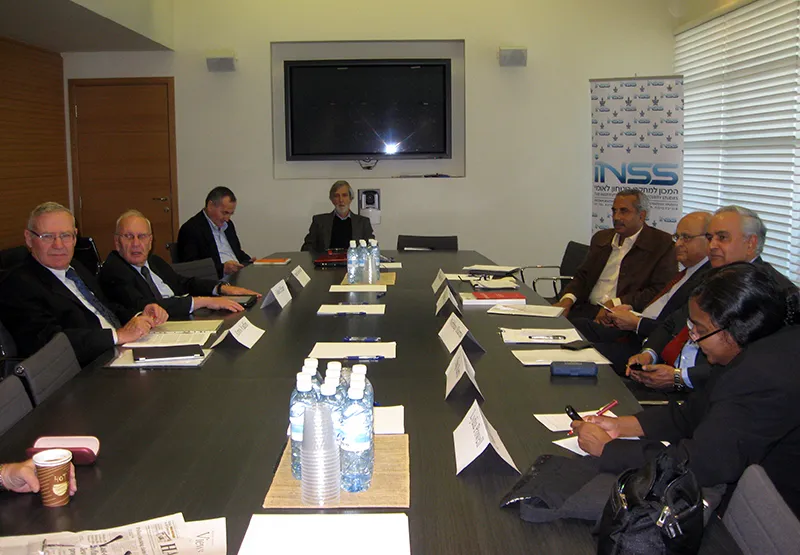-
CENTRES
Progammes & Centres
Location
During the recent INSS-ORF dialogue, there was a consensus that, while perhaps the origin of the terror threat is different, this is an area where cooperation can and should be enhanced.

A two-day strategic dialogue was held between the experts from Observer Research Foundation and the Institute for National Security Studies (INSS), Tel Aviv, on February 18-19, 2013. The discussions at Tel Aviv focused on the bilateral relationship and challenges common to both countries. Topics discussed in greater depth were energy issues, Israeli-India military and defense cooperation and security threats.
ORF team was led by Mr Vikram Sood, Vice President, the Centre for International Relations. Other members were Lt. Gen. Nirbhay Sharma (Retd), Distinguished Fellow, Ms Lydia Powel and Mr Wilson John, Senior Fellows.
The INSS delegation was led by Major General Amos Yadlin, Amb. Oded Eran, Amb. Sagi Karni, Amb. Shimon Stein, Mr Yoram Schweitzer and Mr Yiftah Shapir.
Delegations from both the organizations see US "rebalancing" strategy towards the Asia-Pacific as a gradual withdrawal from the Middle East region. Given the assessment that the US cannot pull out, but reduce its profile in the region, Israel must create or produce an interactive agenda for the US and Israel in the region. The possibility of creating some sort of joint, trilateral approach, which would include a comprehensive agenda for addressing all of the parties’ concerns in relation to the US presence in the region, was also discussed.
On the energy front, the two delegations identified common challenges and interests for possible cooperation. In India, only half of the population has access to modern energy, compared to the universal access in Israel. Increasing access to energy was said to be, first and foremost, a socio-economic problem, which requires social, economic and political responses.
Natural gas is one of Israel’s few natural resources and significant recent offshore gas discoveries have given Israel a reason to be optimistic in this area. This may be an important area for future cooperation, but strategic thinking on the whole issue of energy is lacking which needs to be addressed. The government in Israel needs to have some say in where its resources are exported, whether it is India, the EU, China or elsewhere. Renewable energy and water management practices were also discussed as possible areas for cooperation.
On the Iran issue, India agrees with Israel in opposing Iran’s nuclear weapon ambition, but differs on the means adopted to achieve the goal. Given India’s dependence on energy importation from Iran and its geo-strategic and economic interests in the Persian Gulf, it cannot support further sanctions or any direct involvement in military options. India believes that other options must be tried, instead. Israel is not against a diplomatic solution, so long as a diplomatic solution entails stopping Iran from becoming nuclear.
Both India and Israel face problems with terror. The need to determine the areas of convergence and divergence in fighting terrorism was discussed. There was a consensus that, while perhaps the origin of the threat is different, this is an area where cooperation can and should be enhanced.
In the areas of military and defence cooperation, there was a consensus on the overall importance of the defence relationship as well as on the robustness of the defence cooperation framework. In this regard, there is a lot of room for cooperation. Restructuring the nature of the relationship was discussed as the Indian side expressed the wish to take on a greater role in the production of weapon systems. This led to an interesting debate on the depth and longevity of bilateral alliances, and on the strength of the bonds between states that face similar threats, though in different geo-strategic circumstances.
(This report is prepared by Rachel Beerman, Research Assistant, INSS, Tel Aviv)
The views expressed above belong to the author(s). ORF research and analyses now available on Telegram! Click here to access our curated content — blogs, longforms and interviews.